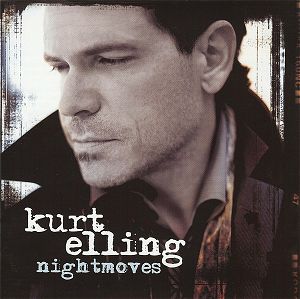Nightmoves [4:22]
Tight [2:53]
Change Partners / If You Never Come To Me
[7:38]
Undun [5:07]
Where Are You My Love? [5:26]
And We Will Fly [4:20]
The Waking [4:11]
The Sleepers [5:27]
Leaving Again / In The Wee Small Hours [5:03]
A New Body and Soul [10:19]
I Like The Sunrise [6:53]
Collective personnel: Kurt Elling (vocal),
The Escher String Quartet, Bob Mintzer (tenor
sax), Howard Levy (harmonica), Grégoire
Maret (harmonica), Laurence Hobgood (piano),
Rob Mounsey (electric piano, keyboards), Guilherme
Monteiro (guitar), Christian McBride (bass),
Rob Amster (bass), Willie Jones III (drums,
shakers)
Recorded 2007, New York
The upper echelons of jazz
singing are largely occupied by female vocalists.
Against such great figures as Billie Holiday,
Sarah Vaughan, Ella Fitzgerald, Betty Carter
and many many more (there’s a plethora of
good female singers at present too), one can
place only a few names of male vocalists,
such as Louis Armstrong, Billie Eckstine (in
some of his work, at any rate), maybe Johnny
Hartman, Mark Murphy, Jon Hendricks and a
few others. Singers such as Frank Sinatra
and Tony Bennett are only occasionally ‘jazz’
singers in anything like the real sense of
the phrase.
Kurt Elling very definitely
merits a place in the select company of the
major male jazz singers. Anyone with a fondness
for vocal jazz who isn’t familiar with Elling’s
work should certainly get themselves a copy
of this new CD (or, indeed one of his earlier
recordings, his level of achievement being
pretty consistent).
Elling has tremendous vocal
control and sense of pitch. H can do vocal
pyrotechnics with the best of them but never
seems to indulge in them for their own sake.
Above all he adds to his purely musical accomplishments
(as it were) a prodigious sensibility to the
potential of his verbal texts and a clarity
of diction that can do justice to it and them.
He is that rare sort of singer (in whatever
field) who makes one suspect that they would
also be fine readers of poetry (as
Cleo Laine, for example, is).
Here Elling is heard in a
variety of more or less intimate contexts.
In ‘The Waking’, which sets a poem by Theodore
Roethke, Elling is accompanied (very well)
by just the bass of Rob Amster. A delightful
medley unites Sinatra’s ‘In The Wee Small
Hours’ with Keith Jarrett’s ‘Leaving Again’;
this last was an improvisation on Jarrett’s
1994 box set Keith Jarrett At the Blue
Note, to which Elling has added lyrics.
In this medley Elling is supported by the
piano of Laurence Hobgood. The opener, Nightmoves
(written by Michael Franks and Michael Small)
finds Elling backed by a quintet of tenor
sax, piano, electric keyboards, bass and drums.
Bob Mintzer’s solo work here is of the highest
quality. On the Adamson-McHugh standard ‘Where
Are You, My Love’, the vocalist is supported
by piano trio and string quartet, in an exquisite
arrangement by Laurence Hobgood and is built
around a Dexter Gordon solo on the original
melody. ‘A New Body and Soul’ presents Elling’s
vocalese lyrics (accompanied this time by
piano trio alone) to another Dexter Gordon
improvisation. With contributions on other
tracks by the guitar of Guilhermo Monteiro
and the harmonicas of Grégoire Maret
and Howard Levy, there is constant variation
of instrumental textures.
This is an album richly illustrative
of Elling’s talents and intelligence as a
singer. Though plenty of thought and preparation
have clearly gone in to the making of the
album, it never feels remotely overproduced.
This is the state of the
art as far as contemporary male jazz singing
goes. A thoroughly satisfying album – save
that it leaves one wanting more when it finishes!
Glyn Pursglove
